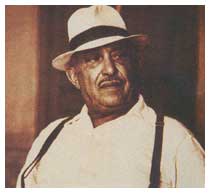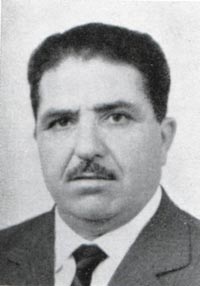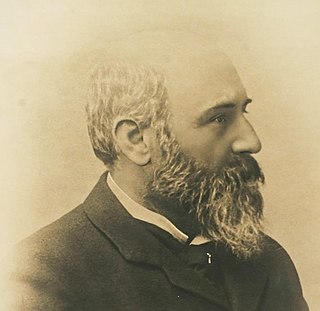Related Research Articles
"Mafia" is an informal term that is used to describe criminal organizations that bear a strong similarity to the organized crime groups from Italy. The central activity of such an organization would be the arbitration of disputes between criminals as well as the organization and enforcement of illicit agreements between criminals through the use of threat or violence. Mafias often engage in secondary activities such as gambling, loan sharking, drug-trafficking, prostitution, and fraud.
The Sicilian Mafia or Cosa Nostra, also referred to as simply Mafia, is a criminal society originating on the island of Sicily and dates back to the mid-19th century. It is an association of gangs which sell their protection and arbitration services under a common brand. The Mafia's core activities are protection racketeering, the arbitration of disputes between criminals, and the organizing and oversight of illegal agreements and transactions.

Stefano Bontade, born Stefano Bontate, was a powerful member of the Sicilian Mafia. He was the boss of the Santa Maria di Gesù Family in Palermo. He was also known as the Principe di Villagrazia − the area of Palermo he controlled − and Il Falco. He had links with several powerful politicians in Sicily, and with prime minister Giulio Andreotti. In 1981 he was killed by the rival faction within Cosa Nostra, the Corleonesi. His death sparked a brutal Mafia War that left several hundred mafiosi dead.
Beati Paoli is the name of a secretive sect thought to have existed in medieval Sicily and possibly also in Malta. The sect, as described by the author Luigi Natoli in his historic novel I Beati Paoli, resembles an order of chivalry fighting for the poor and the commoners. Whereas the novel is fictitious, Sicily's history bears some evidence that the Beati Paoli existed.
The Stidda is a Sicilian and Maltese Mafia-type criminal organization and criminal society centered in the central-southern part of Sicily and Malta.
Salvatore "Ciaschiteddu" Greco was a powerful mafioso and boss of the Sicilian Mafia in Ciaculli, an outlying suburb of Palermo famous for its citrus fruit groves, where he was born. His nickname, "Ciaschiteddu" or "Cicchiteddu", translates from the Sicilian alternatively as "little bird" or as "little wine jug".

Calogero Vizzini, also commonly known as "Don Calò", was a Sicilian Mafia boss of Villalba in the province of Caltanissetta, Sicily. He was considered to be one of the most influential and legendary Mafia bosses of Sicily after World War II until his death in 1954. In the media, Don Calò was often depicted as the "boss of bosses" – although such a position does not exist in the loose structure of Cosa Nostra.

Giuseppe Genco Russo was an Italian mafioso who was the boss of Mussomeli in the province of Caltanissetta, Sicily. Genco Russo, also known as "Zi Peppi Jencu", was an uncouth, sly, semi-literate thug with excellent political connections. A vulgar man, as he used to spit on the floor no matter who was present, he was often photographed with bishops, bankers, civil servants and politicians. He was considered to be the arbiter of Mafia politics, and was regarded as the successor of Calogero Vizzini, who had died in 1954. Although by then a wealthy landowner and politician as a member of Christian Democracy (DC), Genco Russo still kept his mule in the house and the toilet outside, which was little more than a hole in the ground with a stone for a seat and no walls or door according to Mafia turncoat Tommaso Buscetta.
Calcedonio Di Pisa, also known as Doruccio, was a member of the Sicilian Mafia. He was the boss of the Mafia family in the Noce neighbourhood in Palermo and sat on the first Sicilian Mafia Commission, the coordinating body of Cosa Nostra in Sicily.
A series of meetings between Sicilian Mafia and American Mafia members were allegedly held at the Grand Hotel et des Palmes in Palermo, Sicily, between October 12–16, 1957. Also called the 1957 Palermo Mafia summit, the summit discussed the international illegal heroin trade in the French Connection. The FBI believed it was this meeting that established the Bonanno crime family in the heroin trade.

Michele Pantaleone was a respected journalist and expert on the Sicilian Mafia and one of the first to shed light on the links between organized crime and political power.

The Greco Mafia family is historically one of the most influential Mafia clans in Sicily, from the late 19th century. The extended family ruled both in Ciaculli and Croceverde Giardini, two south-eastern outskirts of Palermo in the citrus growing area. Members of the family were important figures in the Sicilian Cosa Nostra. Salvatore "Ciaschiteddu" Greco was the first ‘secretary’ of the Sicilian Mafia Commission, while Michele Greco, also known as The Pope, was one of his successors.

Girolamo Li Causi was an Italian politician and a leader of the Italian Communist Party who was a prominent figure in the struggle for land reform and against the Mafia in Sicily. He labelled large estates Sicily's central problem.

Leopoldo Franchetti was an Italian publicist, politician, and patron. He was a deputy in the Italian Chamber of Deputies and later became a Senator. He was very active in promoting education and concrete solutions for economic, social and political problems in Italy both through his own political initiatives and through his support of his wife Alice Hallgarten.

The Portella della Ginestra massacre refers to the killing of 11 people and 27 wounded during May Day celebrations in Sicily on 1 May 1947, in the municipality of Piana degli Albanesi. Those held responsible were the bandit and separatist leader Salvatore Giuliano and his gang, although their motives and intentions are still a matter of controversy.
Francesco Paolo Bontade, also known as Don Paolino Bonta, was a legendary and powerful member of the Sicilian Mafia. Some sources spell his surname Bontate. He hailed from Villagrazia, a rural village before it was absorbed into the city of Palermo in the 1960s. His father Stefano had been a powerful Mafia boss in the area that included Santa Maria di Gesù and Guadagna.
Francesco Paolo Varsallona or Varsalona was a Sicilian bandit who operated on the island around the turn of the 20th century. He is considered to be the last great bandit of the pre-fascist era. He hailed from Castronovo and was the son of a bandit that had belonged to the notorious band of Angelo Pugliese, better known as "Don Peppino il Lombardo", credited with introducing kidnapping people for money in Sicily.

Niccolò Turrisi Colonna, Baron of Gorgo and Bonvicino, was a Sicilian politician from Palermo.

Bernardino Verro was a Sicilian syndicalist and politician. He was involved in the Fasci Siciliani, a popular movement of democratic and socialist inspiration in 1891–1894, and became the first socialist mayor of Corleone in 1914. He was killed by the Mafia.
The Sicilian Mafia was less active during the era of Fascist Italy and it was fought by Benito Mussolini's government. In June 1924, Mussolini instructed Cesare Mori to eradicate the Mafia from Sicily and on October 25, 1925, appointed Mori prefect of the Sicilian capital, Palermo.
References
- Citations
- ↑ miklem (2018-11-04). "Gabillott". Il-Miklem. Retrieved 2024-07-20.
Fi żminijietna, Il-kelma gabillott, tirriferi għal dak il-bidwi li jaħdem l-għelieqi. F'Malta u fi Sqallija tal-Medjuevu l-gabillott kien dak li jieħu ħsieb jiġbor il-qbiela mingħand il-bdiewa għan-nom tas-sid tal-art.
[In these contemporary times, the word 'gabillott' refers to the farmer that works fields. In Medieval Malta and Sicily, the 'gabillott' was the person that collected the rent from the farmers in the name of the landowner.] - ↑ Gambetta, The Sicilian Mafia, pp. 83-84
- ↑ Dickie, Cosa Nostra, pp. 132-33
- ↑ Albini & McIllwain, Deconstructing Organized Crime, pp. 31-35
- ↑ Lupo, History of the Mafia, pp. 36-37
Sources
- Albini, Joseph L.; McIllwain, Jeffrey Scott (2012). Deconstructing Organized Crime: An Historical and Theoretical Study , Jefferson NC: McFarland, ISBN 978-0-7864-9299-2
- Dickie, John (2004). Cosa Nostra. A history of the Sicilian Mafia, London: Coronet, ISBN 0-340-82435-2
- Gambetta, Diego (1993). The Sicilian Mafia: The Business of Private Protection, London: Harvard University Press, ISBN 0-674-80742-1
- Lupo, Salvatore (2009). History of the Mafia , New York: Columbia University Press, ISBN 978-0-231-13134-6